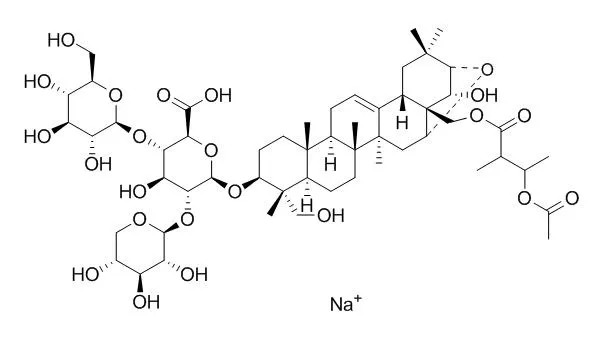| Animal Research: |
| Molecules. 2012 Aug 27;17(9):10267-75. | | Evaluation of in vivo antioxidant and immunity enhancing activities of sodium aescinate injection liquid.[Pubmed: 22926307] | Oxidative stress is involved in the development and progression of disease. Because Sodium Aescinate has been reported to have immunity enhancing and antioxidative effects, we investigated its activity by employing a hepatocellular carcinoma (HCC) mouse model.
METHODS AND RESULTS:
Sixty BALB/c mice were randomly divided into four groups, including a 1.4 mg/kg treated group (n = 15), a 2.8 mg/kg treated group (n = 15), an untreated hepatocellular carcinoma control group (n = 15) and a normal control group (n = 15). After H22 cells were cultured for one week, we collected 2 × 10⁶ cells and injected them subcutaneously as 0.2 mL cell suspensions in sterile saline into the right shoulder region of every mouse. The animals were monitored for changes in activity, physical condition and body weight during the experiment. The next day after injection of H22 cells, animals in these test groups received one intraperitoneal injection of drug or physiological saline for 13 days. Results showed that in the Sodium Aescinate injection liquid (SAIL)-treated HCC mice, serum interleukin-1 beta (IL-1β), interleukin-6 (IL-6), tumor necrosis factor-alpha (TNF-α), interferon-gamma (IFN-γ), Gamma-glutamyltransferase (γ-GT), alanine transaminase (ALT), aspartate transaminase (AST) and alkaline phosphatase (ALP) levels were significantly decreased compared with normal control mice. In addition, treatment with Sodium Aescinate injection liquid significantly decreased blood and liver malondialdehyde (MDA) levels, increased glutathione (GSH) levels, and antioxidant enzyme [superoxide dismutase (SOD), catalase (CAT) and glutathione peroxidase (GSH-Px)] activities in a dose-dependent manner.
CONCLUSIONS:
We conclude that Sodium Aescinate injection liquid can decrease oxidative injury and enhance immunity functions in HCC mice. | | Sichuan Da Xue Xue Bao Yi Xue Ban. 2012 Mar;43(2):170-3. | | [Effects of sodium aescinate on the apoptosis-related genes in lung injury induced by intestinal ischemia reperfusion in rats].[Pubmed: 22650024] | To investigate the relationship between apoptosis-related genes and lung injury induced by intestinal ischemia reperfusion and to explore the effects and its possible mechanism of Sodium Aescinate.
METHODS AND RESULTS:
Rat model of intestinal I/R injury was established with clamping of the superior mesenteric artery for 60 min and then clamping was relieved for 60 min. Twenty-four SD rats were randomly divided into three groups with eight rats in each: sham group, intestinal ischemia/reperfusion group (I/R group) and Sodium Aescinate group (SA + I/R group). Lung wet/dry weight ratio, lung coefficient and Superoxide dismutase (SOD), malondialdehyde (MDA) in plasma and lung tissue were measured, as well as the expression levels of Bcl-2 and Bax proteins in lung tissue were examined using immunohistochemical method. Compared with sham group, lung wet/dry weight ratio, lung coefficient and MDA in plasma and lung tissue were significantly increased, and while the activity of SOD in plasma and lung tissue were decreased significantly in I/R group. At the same time, the protein expression level of Bcl-2 and Bax were significantly increased. But Bax protein expression was much greater than that of Bcl-2, the ratio of Bcl-2 to Bax was decreased significantly in I/R group than that in sham group. Compared with I/R group, lung wet/dry weight ratio, lung coefficient and MDA in plasma and lung tissue were significantly decreased, and while the activity of SOD in serum and lung tissue were significantly increased in Sodium Aescinate + I/R group. At the same time, Bax protein expression was significantly decreased, both Bcl-2 protein expression and the ratio of Bcl-2 to Bax were significantly increased in Sodium Aescinate + I/R group than that in I/R group.
CONCLUSIONS:
Lung injury induced by intestinal ischemia reperfusion is correlated with abnormal expression levels of Bcl-2 and Bax protein which is caused by oxidative injury. Sodium Aescinate can protect the lung injury induced by intestinal ischemia/reperfusion (I/R), which may be mediated by inhibiting lipid peroxidation, upregulating Bcl-2 gene protein expression, improving the ratio of Bcl-2/ Bax to inhibit lung apoptosis. |
|






 Cell. 2018 Jan 11;172(1-2):249-261.e12. doi: 10.1016/j.cell.2017.12.019.IF=36.216(2019)
Cell. 2018 Jan 11;172(1-2):249-261.e12. doi: 10.1016/j.cell.2017.12.019.IF=36.216(2019) Cell Metab. 2020 Mar 3;31(3):534-548.e5. doi: 10.1016/j.cmet.2020.01.002.IF=22.415(2019)
Cell Metab. 2020 Mar 3;31(3):534-548.e5. doi: 10.1016/j.cmet.2020.01.002.IF=22.415(2019) Mol Cell. 2017 Nov 16;68(4):673-685.e6. doi: 10.1016/j.molcel.2017.10.022.IF=14.548(2019)
Mol Cell. 2017 Nov 16;68(4):673-685.e6. doi: 10.1016/j.molcel.2017.10.022.IF=14.548(2019)